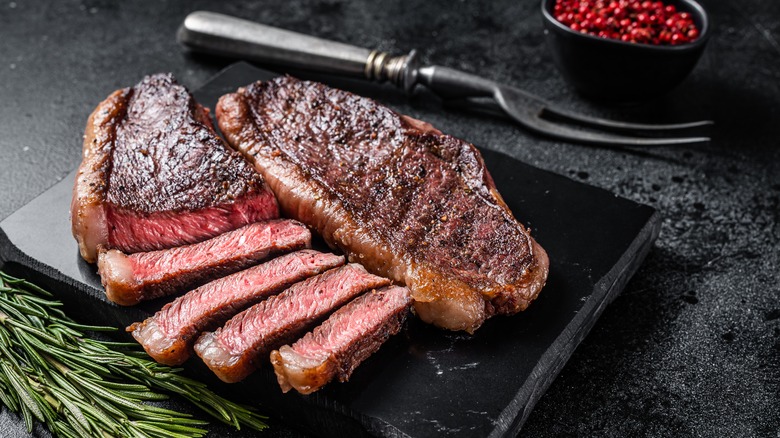What Does It Actually Mean To Be A 'Social Omnivore'?
While the vegetarian versus meat-eater debate seems to be a relatively recent cultural development, people have been choosing plant-based lifestyles for centuries. According to PBS, early vegetarians in ancient Greece referred to themselves as Pythagoreans, which were loosely based on the dietary habits of the philosopher Pythagoras. Greece aside, vegetarianism continued to crop up and gain steam in various parts of the globe, with numerous vegetarian societies and groups popping up at different times throughout history.
These days, avoiding the consumption of animal-based foods is a common choice made by a sizeable group of people. However, many more consider themselves omnivores, which means their diet consists of both plants and animals, per National Geographic. Being an omnivore offers numerous benefits, including a more diverse diet to counter potential shortages in food. (Indeed, carnivores who subsist on meat-only diets cannot adapt without their essential food source.) Omnivores also play a crucial role when it comes to supporting the food chain. However, humans tend to have a lot more leeway when it comes to their diets. The reason? Most people eat for enjoyment, rather than for survival alone — and that means dietary preferences and approaches vary greatly.
Vegetarian at home, meat eater on the town
For people unwilling or unable to adhere to a fully vegetarian lifestyle, there are other options. Writing for Bon Appétit, editor Ali Francis coins the phrase "social omnivore," which she defines as a person who does not eat meat at home but will indulge at restaurants and/or when enjoying meals at the homes of loved ones. According to Francis, some people follow the social omnivore lifestyle to balance their love of meat preparations with concerns about the environment, animal welfare, and wellness. Others do so because they find meat-based meals to be culturally or socially significant within their circle of friends and family.
Upon further research, it appears Francis is largely responsible for the term "social omnivore" as a phrase that defines the concept. However, the dietary lifestyle also bears some similarities to flexitarianism, per Healthline. A combination of the words "flexible" and "vegetarian," dietitian Dawn Jackson Blatner developed this lifestyle approach to make vegetarianism less intimidating to the average person. Much like social omnivores, flexitarians primarily subsist on a plant-based, meat-free diet, but will occasionally consume animal-based products at their discretion. Because they allow for more wiggle room, these emerging movements are quite attractive to people who want to enhance their diets but can't fully commit to a meat-free lifestyle.
Shifting attitudes towards meat consumption
Despite upticks in vegetarianism, meat remains a crucial part of the American diet, and there's plenty of data to back that up. According to a 2021 poll conducted by Ipsos, a whopping 89% of respondents stated that meat plays a significant role in their eating habits, and 59% of those surveyed associated meat eating with the American lifestyle. (Lastly, 26% were concerned that plans are in the works to ban red meat consumption within the U.S. — a seemingly reactionary answer linked to American domestic policy, per CNN — despite no actual basis in fact.)
Regardless of the passionate stances American mean-eaters might have on their dietary practices, there's also evidence that a more vegetarian-oriented trend is on the rise among the U.S. population. Another poll conducted by Gallup in 2020 showed that 23% of Americans claimed to have eaten less meat that year compared to previous ones. When it came to the reasons given by respondents for reducing their meat intake, worries about future health issues ranked the highest, while concerns about the environmental impact of meat consumption ranked second. So while the number of non-meat eaters seems to be growing, rates of vegetarianism have remained the same over the last two decades, with about 5% of people claiming the actual vegetarian label. In fact, many people have decided to forge their own paths when it comes to dietary lifestyles.


